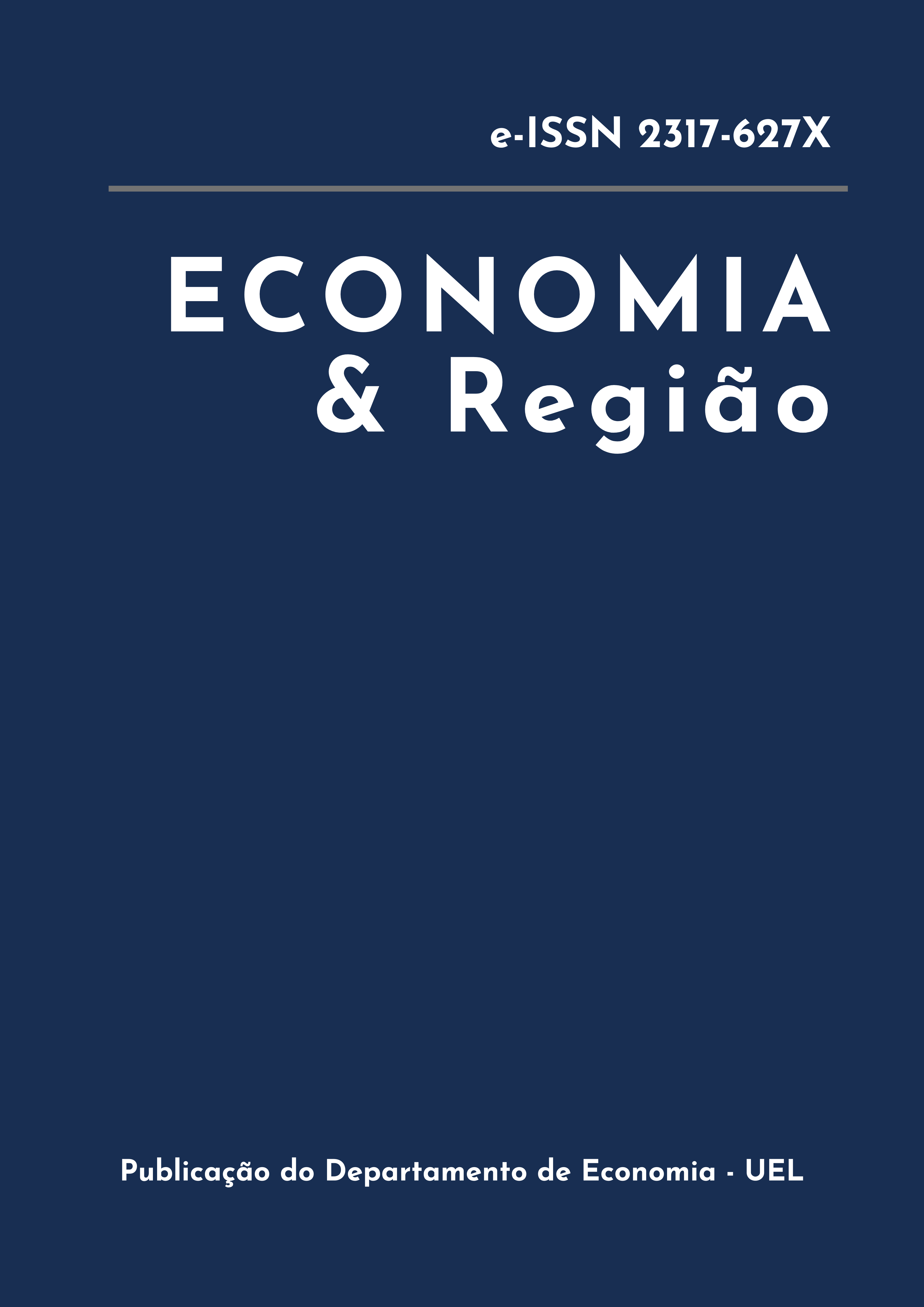The maintaining factor of Brazilian inflation post-Real
Empirical evidence based on an Autoregressive Markov Switching model
DOI:
https://doi.org/10.5433/2317-627X.2024.v12.n3.49175Keywords:
inflation strategy, distributive conflict , Autoregressive Markov SwitchingAbstract
The present paper seeks to identify the occurrence, duration and transition probabilities of different inflation regimes in the post-Real Brazilian economy. The inflation theory used is inflation by distributive conflict, whose typifications of inflation are the equilibrium inflation regime and stratum-inflation.
The empirical investigation is carried out through an Autoregressive Markov Switching model and uses the monthly Brazilian IPCA (Index of Consumer Prices) inflation, from January 1995 to May 2023.
The obtained results indicate the occurrence of two inflation regimes, where the most persistent is the stratum-inflation regime. The transition probabilities show that given that it is in the stratum-inflation regime, the probability of transitioning from regime is relatively small, however, the probability of remaining in it is 98%. The duration of the stratum-inflation regime is fifty-one periods. Inflationary memory as an explanatory variable for present inflation is statistically significant and confirms the existence of a factor that maintains inflation
Downloads
References
ABRITA, M. B.; SBARDELLATI, E. C. A. Nível de preços no território brasileiro: uma análise empírica de seus determinantes. Espaço e Economia, Rio de Janeiro, ano 8, n. 16, p. 1-24, 2019. DOI: https://doi.org/10.4000/espacoeconomia.9999.
BACHA, C. J. C.; LIMA, R. A. S. A curva de Phillips e a economia brasileira: período de 1991 a 2002. Pesquisa & Debate, São Paulo, v. 15, n. 25, p. 131-162, 2004. Disponível em: https://revistas.pucsp.br/index.php/rpe/article/view/11944. Acesso em: 12 dez. 2023.
BALESTRASSI, P. P.; POPOVA, E.; PAIVA, A. P.; LIMA, J. W. M. Design of experiments on neural network's training for nonlinear time series forecasting. Neurocomputing, Amsterdam, v. 72, n. 4-6, p. 1160-1178, Jan. 2009. DOI 10.1016/j.neucom.2008.02.002.
BASTIAN, E. F.; SETTERFIELD, M. A simple analytical model of the adverse real effects of inflation. Journal of Post Keynesian Economics, Abingdon, v. 38, n. 4, p. 637-665, Ago. 2015. DOI: http://dx.doi.org/10.2139/ssrn.2653131.
BASTIAN, E. F.; SETTERFIELD, M. Nominal exchange rate shocks and inflation in an open economy: towards a structuralist inflation targeting agenda. Cambridge Journal of Economics, Cambridge, v. 44, n. 6, p. 1271-1299, May 2020. DOI: https://doi.org/10.1093/cje/beaa008.
BRESSER-PEREIRA, L. C. Economia brasileira: uma introdução crítica. 3. ed. São Paulo: Editora 34, 1998.
CAMPEDELLI, A. L.; SILVA, F. P. da. Conflito distributivo e inflação: uma análise do caso brasileiro entre 2011-2018. Pesquisa & Debate, São Paulo, v. 35, n. 62, p. 44-63, 2022. DOI: https://doi.org/10.23925/1806-9029.v35i2e60736.
CAMPELO, A.; BRAZ, A. F.; LIMA, T. F. L.; AZEVEDO, J. C. A pressão da inflação da pandemia sobre as famílias mais pobres. Fundação Getulio Vargas, Rio de Janeiro, 25 abr. 2022. Disponível em: https://portal.fgv.br/artigos/pressao-inflacao-pandemia-sobre-familias-mais-pobres. Acesso em: 12 dez. 2023.
CARVALHO, F. Mr. Keynes and the post keynesians: principles of macroeconomics for a monetary production economy. Aldershot: Edward Elgar, 1992.
CARVALHO, F. Strato-inflation and high inflation: the brazilian experience. Cambridge Journal of Economics, Cambridge, v. 17, n. 1, p. 63-78, Mar. 1993. DOI: https://doi.org/10.1093/oxfordjournals.cje.a035224.
CAVICCHIOLI, M. Determining the Number of Regimes in Markov Switching Var
and Vma Models. Journal of Time Series Analysis, v. 35, p. 173-186, 2014.
EICHNER, A. S.; KREGEL, J. A. An essay on post-keynesian theory: a new paradigm in economics. Journal of Economic Literature, Nashville, v. 13, n. 4, p. 1293-1314, Dec. 1975. Disponível em: https://www.jstor.org/stable/2722299. Acesso em: 12 dez. 2023.
FERRARI FILHO, F.; PAULA, L. F.; ARESTIS, P. A nova política monetária: uma análise do regime de metas de inflação no Brasil. Economia e Sociedade, Campinas, v. 18, p. 1-30, abr. 2009. DOI: https://doi.org/10.1590/S0104-06182009000100001.
FRÜHWIRTH-SCHNATTER, S. Finite mixture and Markov switching models. Berlim: Springer Science & Business Media, 2006.
GASTARDELO, T. A. R.; MELZ, L. J.; MARION FILHO, P. J.; VIEIRA, K. M.; CERETTA, P. S. Transmissão de preço do milho para carne de frango: uma análise com regime switching de Markov. Custo e @gronegócio Online, Recife, v. 12, n. 1, p. 18-35, jan./mar. 2016. Disponível em: https://www.researchgate.net/publication/305774724_Transmissao_de_preco_do_milho_para_carne_de_frango_uma_analise_com_regime_switching_de_Markov#read. Acesso em: 12 dez. 2023.
GIAMBIAGI, F.; VILLELA, A.; CASTRO, L. B. de; HERMANN, J. (org.). Economia brasileira e contemporânea (1945-2010). 2. ed. Rio de Janeiro: Elsevier, 2011.
GOLDFELD, S. M.; QUANDT, R. E. Um modelo de Markov para regressões de comutação. Journal of Econometrics, Amsterdam, v. 1, n. 1, p. 3-16, 1973.
HAMILTON, J. D. A new approach to the economic analysis of nonstationary time series and the business cycle. Econometrica, New Haven, v. 57, n. 2, p. 357-384, Mar. 1989. DOI: https://doi.org/10.2307/1912559.
HAMILTON, J. D. Time series analysis. Princeton: Princeton University Press, 1994.
IBGE. IPCA: índice nacional de preços ao consumir amplo. Rio de Janeiro: IBGE, [2023]. Disponível em: https://www.ibge.gov.br/estatisticas/economicas/precos-e-custos/9256-indice-nacional-de-precos-ao-consumidor-amplo.html. Acesso em: 12 dez. 2023.
JACKSON, D.; TURNER, H. Inflation, strato-inflation and social conflict. In: JACKSON, D.; TURNER, h.; WILKINSON, F. Do trade unions cause inflation?. Cambridge: Cambridge University Press, 1972. p. 63-78.
KALECKI, M. Costs and prices. In: KALECKI, M. Selected essays on the dynamics of the capitalist economy. Cambridge: Cambridge University Press, 1971. p. 43-124.
KIM, C. J.; NELSON, C. R. State-space models with regime switching: classical and gibbs-sampling approaches with applications. Cambridge: MIT Press, 1999.
KROLZIG, H. M. Markov-switching vector autoregressions: modelling, statistical inference, and application to business cycle analysis. Berlim: Springer, 1997.
LAVOIE, M. Post-keynesian economics: new foundations. Cheltenham: Edward Elgar, 2014.
LOPES, J. C.; ROSSETTI, J. P. Economia monetária. 7. ed. São Paulo: Atlas, 1998.
LOPES, L. S.; SOARES, T. C. Regimes inflacionários e ciclos econômicos: a experiência brasileira pós-plano real. Revista Brasileira de Economia, Rio de Janeiro, v. 72, p. 410-428, 2018. DOI: https://doi.org/10.5935/0034-7140.20180020.
MODENESI, A.; ARAUJO, E. Custos e benefícios do controle inflacionário no Brasil (2000-2008): uma avaliação com base em um modelo VEC. In: CONGRESSO DA ASSOCIAÇÃO KEYNESIANA BRASILEIRA, 2., 2009, Porto Alegre. Anais [...]. Porto Alegre: AKB, 2009. Disponível em: https://ideas.repec.org/p/anp/en2010/057.html. Acesso em: 12 dez. 2023.
MORLIN, G. S. Inflation and conflicting claims in the open economy. Review of Political Economy, Abingdon, v. 35, n. 3, p. 762-790, Jan. 2023. DOI: https://doi.org/10.1080/09538259.2022.2150451.
RODRIGUES, W. G. Mudanças de regimes na função de reação do banco central do Brasil: uma abordagem utilizando Markov regime switching. 2015. Dissertação (Mestrado em Economia) - Escola de Economia de São Paulo, Fundação Getúlio Vargas, São Paulo, 2015. Disponível em: http://hdl.handle.net/10438/13967. Acesso em: 12 dez. 2023.
ROMÃO, E. L. Estudo comparativo entre redes neurais artificiais e Markov-switching model na modelagem de séries temporais não lineares. 2019. Dissertação (Mestrado em Ciências em Engenharia de Produção) - Universidade Federal de Itajubá, Itajubá, 2019. Disponível em: https://repositorio.unifei.edu.br/jspui/handle/123456789/2031. Acesso em: 12 dez. 2023.
ROWTHORN, R. E. Conflict, inflation and money. Cambridge Journal of Economics, Cambridge, v. 1, n. 3, p. 215-239, Sept. 1977. DOI: https://doi.org/10.1093/oxfordjournals.cje.a035360.
SACHSIDA, A. Inflação, desemprego e choques cambiais: uma revisão da literatura sobre a curva de Phillips no Brasil. Revista Brasileira de Economia, Rio de Janeiro, v. 67, n. 4, p. 121-132, dez. 2013. DOI: https://doi.org/10.1590/S0034-71402013000400009.
SAMUELSON, P. A.; SOLOW, R. M. Analytical aspects of anti-inflation policy. The American Economic Review, Nashville, v. 50, n. 2, p. 177-194, May 1960. Disponível em: : https://www.jstor.org/stable/1815021. Acesso em: 12 dez. 2023.
SANTORO, J. P. C. Conflito, inflação e distribuição: três ensaios heterodoxos. 2020. Tese (Doutorado em Economia) - Universidade Estadual de Campinas, Campinas, 2020. DOI: https://doi.org/10.47749/T/UNICAMP.2020.1127181.
SCHWARTZMAN, F. F. Estimativa da curva de Phillips para o Brasil com preços desagregados. Economia Aplicada, Ribeirão Preto, v. 10, n. 1, p. 137-155, jan./mar. 2006. DOI: https://doi.org/10.1590/S1413-80502006000100008.
SERRANO, F. ; SUMMA, R. Conflito distributivo e o fim da "breve era de ouro" da economia brasileira. Novos estudos CEBRAP, Rio de Janeiro, v. 37, p. 175-189, 2018. DOI: http://dx.doi.org / 10.25091/.
SERRANO, F. L. P. ; SUMMA, R. F. Política macroeconômica, crescimento e distribuição de renda na economia brasileira dos anos 2000. In: ENCONTRO INTERNACIONAL DA ASSOCIAÇÃO KEYNESIANA BRASILEIRA, 4., 2011, Rio de Janeiro. Anais [...]. Rio de Janeiro, AKB, 2011. p. 1-20. Disponível em: https://circusrevista.com.ar/wp-content/uploads/Serrano-Summa-2011-AKB.pdf. Acesso em: 12 dez. 2023.
SERRANO, F. Juros, câmbio e o sistema de metas de inflação no Brasil. Revista de Economia Política, São Paulo, v. 30, n. 117, p. 63-72, jan./mar. 2010. DOI: https://doi.org/10.1590/S0101-31572010000100004.
SERRANO, F. Mind the gaps: the conflict augmented Phillips curve and the sraffian supermultiplier. Rio de Janeiro: Instituto de Economia da UFRJ, 2019. (Texto para discussão, n. 11).
SILVA, L. G.; FREITAS, F. N. P. SALÁRIO REAL E CONFLITO DISTRIBUTIVO NA ECONOMIA BRASILEIRA DE 2000 A 2014. Análise Econômica, 39(79). DOI: https://doi.org/10.22456/2176-5456.92015
GOMES, L. S.; FREITAS, Fabio. Salário real e conflito distributivo na economia brasileira de 2000 a 2014. Revista de Análise Econômica, v. 39, n. 78, p. 107-132, 2021.
SQUEFF, G. Repasse cambial reverso: uma avaliação sobre a relação entre taxa de câmbio e IPCA no Brasil (1999-2007). In: CONGRESSO DA ASSOCIAÇÃO KEYNESIANA BRASILEIRA, 2., 2009, Porto Alegre. Anais [...]. Porto Alegre: AKB, 2009. Disponível em: http://www.bdtd.uerj.br/handle/1/7573. Acesso em: 12 dez. 2023.
SUMMA, R.; BRAGA, J. Two routes back to the old Phillips curve: the amended mainstream model and the conflict-augmented alternative. Bulletin of Political Economy, [s. l.], v. 14, n. 1, p. 81-115, 2020. Disponível em: https://www.researchgate.net/publication/346946588_Two_routes_back_to_the_old_Phillips_curve_the_amended_mainstream_model_and_the_conflict-_augmented_alternative#read. Acesso em: 12 dez. 2023.
Downloads
Published
How to Cite
Issue
Section
License
Copyright (c) 2024 Elianara Gomes dos Santos

This work is licensed under a Creative Commons Attribution 4.0 International License.
Economia & Região adota a Licença Creative Commons Attribution CC-BY 4.0 International, portanto, os direitos autorais relativos aos artigos publicados são do(s) autor(es), que cedem à Revista Economia & Região o direito de exclusividade de primeira publicação.
Sob essa licença é possível: Compartilhar - copiar e redistribuir o material em qualquer suporte ou formato. Adaptar - remixar, transformar, e criar a partir do material, atribuindo o devido crédito e prover um link para a licença e indicar se mudanças foram feitas.




















